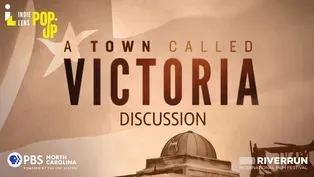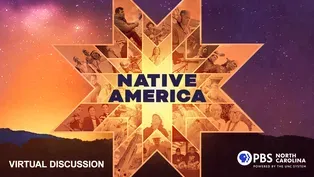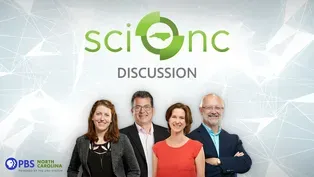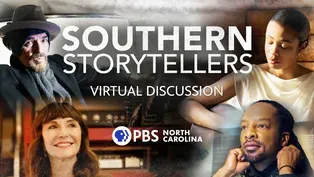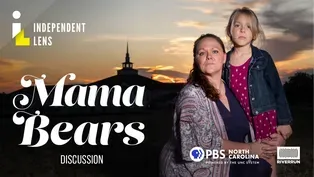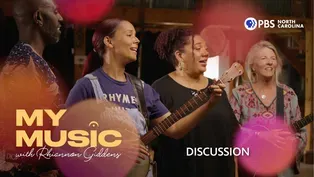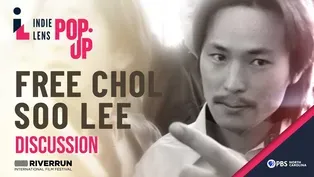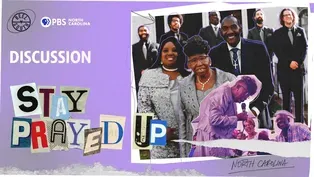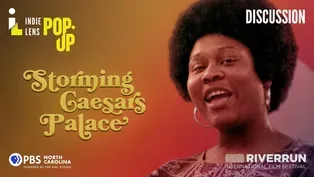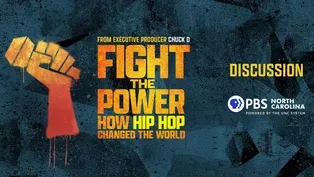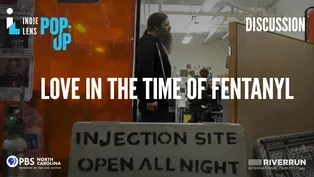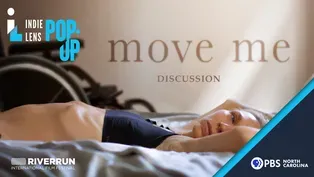PBS North Carolina Specials
Discussion | Reel South: Little Satchmo
3/30/2022 | 42m 57sVideo has Closed Captions
The filmmakers talk about jazz icon Louis Armstrong and his secret daughter.
Reel South’s Nick Price chats with Sharon Preston-Folta, Armstrong’s daughter, and filmmakers, John Alexander, JC Guest, Lea Umberger and Eddie Korvin. They share their journey telling this heartbreaking and inspirational narrative about Louis Armstrong and the daughter his adoring public never new about—until now. Sharon shares details about growing up in the shadows and her triumphs.
PBS North Carolina Specials
Discussion | Reel South: Little Satchmo
3/30/2022 | 42m 57sVideo has Closed Captions
Reel South’s Nick Price chats with Sharon Preston-Folta, Armstrong’s daughter, and filmmakers, John Alexander, JC Guest, Lea Umberger and Eddie Korvin. They share their journey telling this heartbreaking and inspirational narrative about Louis Armstrong and the daughter his adoring public never new about—until now. Sharon shares details about growing up in the shadows and her triumphs.
How to Watch PBS North Carolina Specials
PBS North Carolina Specials is available to stream on pbs.org and the free PBS App, available on iPhone, Apple TV, Android TV, Android smartphones, Amazon Fire TV, Amazon Fire Tablet, Roku, Samsung Smart TV, and Vizio.
Providing Support for PBS.org
Learn Moreabout PBS online sponsorshipMore from This Collection
Discussion - A Town Called Victoria - Independent Lens
Video has Closed Captions
The filmmaker and former Victoria residents share their story. (46m 51s)
Discussion - Native America Season 2
Video has Closed Captions
Panelists discuss preserving the languages of Native American tribes. (39m 1s)
Video has Closed Captions
Sci NC executive producer and host, Frank Graff, chats about upcoming Season 6 of Sci NC. (26m 6s)
Discussion - Southern Storytellers
Video has Closed Captions
Author David Joy and others discuss storytelling and their new PBS series. (42m 13s)
Discussion - Mama Bears | Independent Lens
Video has Closed Captions
Producer and director Daresha Kyi discusses the film and LGBTQIA+ advocacy. (34m 41s)
Discussion - My Music with Rhiannon Giddens
Video has Closed Captions
Discussing the series with producers Will & Deni McIntyre and country artist Rissi Palmer. (39m 56s)
Discussion - Free Chol Soo Lee | Independent Lens
Video has Closed Captions
Local lawyers, professors and nonprofit leaders discuss wrongful convictions and reentry. (40m 44s)
Discussion - Stay Prayed Up, Reel South
Video has Closed Captions
The filmmakers discuss their journey with Mother Perry and The Branchettes. (45m 4s)
Discussion - Storming Caesars Palace | Independent Lens
Video has Closed Captions
Local professors and nonprofit leaders discuss welfare and the social safety net. (33m 2s)
Discussion - Fight the Power: How Hip Hop Changed the World
Video has Closed Captions
Local experts discuss the history of hip hop with PBS North Carolina. (59m 43s)
Discussion - Love in the Time of Fentanyl | Independent Lens
Video has Closed Captions
Local harm reductionists, therapists and others discuss the opioid crisis and more. (55m 44s)
Discussion | Independent Lens: Move Me
Video has Closed Captions
A dancer with blindness and disability advocates discuss adaptable arts programs. (38m 46s)
Providing Support for PBS.org
Learn Moreabout PBS online sponsorship- Hi everyone.
- [Sharon] Hey.
- I'm greeting the crowd here.
Please rejoin us in this zoom.
I'm Nick Price, I'm the series producer for Reel South.
I wanna thank everyone for joining us this evening, and I hope you enjoyed watching Little Satchmo for those of you who've never seen it.
This is probably my, I don't know, 60th time seeing it.
And I gotta say I'm just as riveted and encapsulated into that world, into Sharon's world and this beautiful film every time I watch.
So I'm really glad I was able to just kind of sit with that.
I wanna welcome all of our filmmakers and before we get started, I just wanted to say again, that Reel South in partnership with PBS, North Carolina, Louisiana Public Broadcasting, and South Carolina ETV, appreciates everyone joining us for this special screening event and kick off of our seventh season of our broadcast series, Reel South.
Reel South is supported by the National Endowment for the Arts, South Arts and the Center for Asian-American Media.
And we are distributed by PBS.
So I do have some guests I wanna introduce to everyone.
And I really wanna dive into the questions because I have been taking some more notes and I just wanna really dive in with you all, but I wanna get everyone a chance to talk and to introduce themselves.
So with us here tonight is John Alexander, the Producer and Director of the film.
We also have Sharon Preston-Folta.
Many of you might recognize this incredible storyteller, the executive producer of her own film and the writer of her memoir.
Sharon, hi.
- Hi everyone.
- We also have with us producers, Lea Umberger and JC guest.
We also have Eddie Corbin, the Assistant Director, and Composer of the film.
So thank you all, thanks for joining us.
I'm so thrilled you're all here.
So thank you.
I wanna go ahead and get started.
Sharon coming to you first, because I just gotta say, this was obviously, I'm venture to say this is maybe the most personal thing you've ever done, especially in the [indistinct] way.
- Absolutely.
Yes.
- What made you decide to write your memoir, not only write your memoir, but bring it to the public and bring it to audiences in this medium, in this format?
- Well, I decided to write my memoir because I had become 50 years old, I was already a grandmother and just really taking a look at my life and the legacy I wanted to leave them.
And the secret had been with me all of my life.
I will say, poorly kept secret because good friends of mine, my relatives, they all knew and of course the band members who met mom and I, but it wasn't publicly known.
And I just felt that it was time to tell my story, but I wasn't sure how to go about it.
But once I figured out that I needed to write my story, then I just took the letters that I had, my memories, put the conversations together and wrote the memoir.
It was in meeting Lea several years later.
And Lea and I met through my work.
I gave her a copy of my book and she read it.
And then a couple of years after that, she called me and said, that she loved the story and she'd liked to be produce it as a documentary.
Asked me, would I trust her and told me that she had a director in mind, so that's how that got started.
And that was 2019.
- Wow, and I gotta say, in such a short amount of time, you all have produced this incredible story and this incredible film.
I wanna go to the rest of the filmmaking team.
And maybe we'll start with Lea since you've mentioned, this is kind of a genesis of the project, but Lea and John and JC and Eddie, I'm curious what drew you to Sharon's story and what drew you to making this film?
- I'll say from my end of it, it is, it took me a little while to get to the point where I was able to ask Sharon, because it's the first film that I have produced.
And it was something that I was nervous about doing 'cause I'd never done it before.
I've done production design, and I've been in the film area for a while, but never done it on my own.
So, I had met John and JC through their film, "This is Love" and was sort of thinking about doing Sharon's film or making Sharon's memoirs into a film.
And I was like, "Oh, maybe I could work with them."
And then John and JC knew Eddie.
So it was sort of like a big square of people as opposed to a triangle, but it's sort of all connected in a way that was really what was really unique and amazing in the sense that I didn't think that I would find so many connections within one partners.
- Yeah, and like, I'll just jump in here for me after Lea brought Sharon's memoir, first of all, Lea put together a whole package of Sharon's kind of wealth of letters and like all of her production design background, which she's being modest about is like completely through the roof, amazing.
And she compiled all these materials.
So, she brought JC and myself, basically not only Sharon's memoir, but kind of a wealth of materials around it that sort of fleshed it out and gave us sort of a lookbook of a picture into what this could look like.
And those ideas were kind of already in development right off the bat.
But what, what it drew me to Sharon's story back to like your critical question was really just like the experience I had reading her book.
The first time I read the memoir was, it was kind of like, "Wow!"
Like, first of all, "What a great hook, the fact that it's like basically the most public American persona or character icon, you could pretty much come up with for at least the 20th century if not more, coupled with or coupled against the most private story."
It was like, "How can this even exist?"
Something so private behind something so public.
So that just as a dichotomy really intrigued me but again, it was really just reading her book and her voice coming through singularly and strongly her it's very simple memoir.
She basically just accounts her life and says, this is what happened, basically coming to the realization that she matters.
It was that that sort of simpleness the simplicity of it that spoke to her strength to me, it was really was like, wow this is just clean and strong and simple and what we can do, whatever we can do to translate this memoir as strong as it is into film, without tampering with it, really just lifting that direct, full frontal "Here it is, take it or leave it, this is my life," first person account was sort of the artistic interest for me.
It was like, "Let's try to not interfere here.
Let's Sharon's voice finally take center stage as it probably should have many, many years or decades ago."
But what a great opportunity for her to actually have her voice drive the story.
So we tried to, that was that voice, which her memoir is really written in her voice.
It's like, as if she's talking much like her father's memoirs were written, we came to the realization the other day.
But yeah, so we try to preserve that into the film.
And that's something that I'm proud to say, I think did translate into the film and just, I think Sharon's inspiring.
So now I'm super glad that other people are able to hear her voice rather than just us reading it on a script.
It's really out there, so great to see that.
- That's fantastic.
JC I know you have another guest with us today, so feel free to chime in whenever you can or want to, I won't designate you until, 'cause I don't know what's going on behind that microphone, but I wanna jump to Eddie here because Eddie I'm really curious too what drew you to this project?
Any film about Louis Armstrong in his life or, is clearly going to be an, music is gonna play an important factor and to the telling of this story.
So I'm really interested in what kind of pressure you felt in composing music for this and helping supervise the music for this.
So how did you really tackle that?
- Well, I was drawn to the project by John Alexander, who I've known for quite a number of the years and have had the pleasure of working with him previously a few times on film projects.
And he knows that I had a long career in the music business, as they say, wearing many hats.
And I got involved pretty early on reading the script or reading Sharon's memoir rather, and working with John and JC primarily on helping to put together the kind of music that we were gonna use to illustrate both Armstrong's life and career [dog barking] and how that related to Sharon.
And fortunately for me as a musician, as a sound engineer [phone rings] and as a composer with a phone ring, I had considerable experience in all different areas of music.
And one of my loves is traditional American music, including what came out of New Orleans as a city in the early 1900s and developed from there.
So it was really became a labor of love for me and I just became very involved in the whole project, working closely with the team.
And just as a click aside, writing music, original music for the end credits and also some motifs during the film kind of came afterwards.
It was not an original plan, but since I had become so involved during the course of the film and it lived with me and lived in me, it kind of came naturally to try to express my musical feelings about Sharon and about her story.
So that's about it.
- That's really interesting.
And I commend you on the work as I do all of the filmmakers here.
- Sure.
- I wanna keep going here.
And we do, I just wanna let all of our viewers who are watching, feel free to go ahead and start inputting your questions and I'll try to get to as many as I can that we don't already answer, but I wanna go quickly back to Sharon.
Whenever I'm writing or trying to describe the film or your story here, I have an urge to frame it in a sort of feminist retelling or reclaiming of your story.
And so I'm curious if you agree with that.
When we look at recorded history, women's stories are often shadowed or marginalized behind male figures.
And so did you ever think about your story in this context, especially within sort of your father's, indomitable shadow here?
- No, I did not.
I was thinking more of from a child's point of view, from how, and really every time I sat down to write, just really calling back the emotions and the feelings that I had during this time, of course, when I was real little as I state in the book, it was just fun, the traveling and all the things that I did, but it was as I got older.
So it was, it was more about where I was at and what was going on and my mother's feelings as well, because they were very dominant in our household.
As the years went on, her mood definitely changed because their relationship changed and they were starting to grow apart.
So, and you can start to feel the difference.
So it was more from me as a small child growing up.
- That's really interesting.
And so I'm curious why, what is it, when I think of a child's perspective, I think of a sort of innocence or naivety to it.
And so why do you feel like that was the important sort of perspective to bring to this story?
- Just, as you say, when you think of a child's perspective, you think of the innocence in naivete, and I didn't have that.
I was in an adult world, I was asked to do adult things, to be quiet.
I was not really spoken to in a way that would have me understand.
I was just "Do as I say," and just accept it and not really allowed to ask a lot of questions.
So I didn't have that innocence, that feeling that children have, they just feel that they can talk to their parents.
And there is that close connection.
Mom and I had a good relationship, but because of the dynamics of the relationship, I was limited as to what I could say and ask.
So, it definitely clouded my childhood and me growing up and became more so as I got older.
- Yeah.
JC and Lea, I mean, I'm curious too, when you're making this film and reading and learning about Sharon's story and the intricacies here from her childhood, how do you see yourselves in the making of this story?
How do you see yourselves in Sharon's story that is.
- JC, did you want a chance to start first or are you good?
- Yeah, sure.
I mean, I guess one thing that was, kind of an unplanned in going about this, that I'm sure everyone has figured out by now, because she refused to go to bed is that, John and I during post-production, we were making this film while planning to have a child of our own and anticipating that.
And I really think that did change how I came to see the story and understand, the family dynamics.
[child sound] One thing that I had really, sort of was talking with John about from the beginning is that, this is a domestic story, and one of the things about a domestic story [child cries] is that it is talk telling the story of, from a female point of view of the woman and child.
And I do think that that was important and that went a lot about that really did play a part in how we chose to tell Sharon's story with focusing on the house, those empty spaces, really trying to capture.
It wasn't out being a part of the world in the hustle and bustle and the public life that Sharon's father experience.
We really tried to capture that world of Sharon and her mom.
So that was really important to me and really making clear that this is a story that involves Louis Armstrong, but from a very different point of view.
And we wanted that to be clear, and we wanted that to be very different than other biographical material that's out there about him.
And I hope that we are able to do that.
And once again, I'm very sorry about Ellie Mae.
She- - I've gotta cut you off, you do not need to apologize, no, no [indistinct chatters] mastering being [indistinct] - Being completely over confident first time, mom, I thought I could just push your bedtime one hour earlier and everything would be okay.
[Lea laughing] Clearly it didn't work.
- But we're so thrilled that you could join us.
Lea, do you wanna take a go with that?
- Yeah, yeah, I can definitely say that it, when I first goes into reading, the first time I'm reading through Sharon's memoirs is I really connected to it as a daughter because I am a daughter, but also just the idea of that relationship and what that meant in her life and how that affected Sharon, I got to know Sharon really well over the last few years and sort of seeing how, what happens to all of us as a child obviously reflects what we do with the rest of our lives.
And it was really interesting to me to see how Sharon lived her life as a child used that to then form her career as an adult, and then came back to what formed it as a child.
So it was this really interesting cycle to sort of watch that happen and unfold through this process, and it really that's one of the things that drew me to it.
And in the side of looking at, I will also say looking at Louis Armstrong as a father changes some of the ways that I would look at or listen to his music.
So that was the other side of it.
It wasn't, for me, it was never about him or his persona, but it was more about like the real person, like very seldom do we get the real person underneath those images.
So that was really important that Sharon was that key to that part of it.
- Yeah and that's really interesting.
John and Eddie and anyone else who can contribute to this question, the archival in this film is this really rich tapestry.
So I'm curious to know more about what guided you all throughout the editing of this film's just imagery.
And to me, I mean, it really is a period piece.
So, I'm also curious, like what were you hoping to accomplish in transporting us back into time, back into Sharon's childhood's world?
- Yeah, yeah.
I mean, I think the archival stuff, maybe JC and Lea can elaborate on that a bit more, but in terms of the way we were looking at this in terms of the period piece and make, holding the audience's hand in terms of leading them, on some sort of journey was basically like, "Let's put the audience in the perspective of Sharon.
Let's try to ground our viewers in those little shoes, in that little blue dress, looking out the window, watching her dad on TV."
That that was the impetus that really framed all of our decisions, including the archival decision making, whatever matrix, which was basically like we really only were, we weren't gratuitously just showing Louis Armstrong performing, playing the trumpet, singing, it was always needed to be motivated by, "Okay, how does this connect to Sharon?
Was Sharon listening to her dad on the radio?"
For example, like what a wonderful world and hello Dolly brief mentions in the film.
But the only reason they're there is, because Sharon was in the house in Mount Vernon, listening to her dad when he was having these hit recordings, and it was about that longing for her father, same thing with all the archival material that Johnny Carson show these are impactful moments in Sharon's life.
And selecting them really had to be matched up with Sharon's perspective on her father.
So the archival footage is really, you could argue is less about kind of immersing the audience in performances of Louis Armstrong, Sharon's father or the music or the images themselves, but more of how was Sharon actually accessing these things.
And we tried to put the audience in that space and the archival stuff by the way that Johnny Carson, a little behind the scenes that is together from Lea and JC and Eddie, all divide up and find different images and music.
"Oh, how about this and this and the other thing?"
And then we, I mean, a lot of movie magic goes into this to actually create a lot of those files in our clips aren't actually available anymore.
So a lot of these things were actually artful editing to bring together the illusion of Johnny Carson and Louis Armstrong on the television in Sharon's living room.
And just Sharon's living room and of itself is a period piece, because forget about what's even the archival on the television.
This is essentially a period set that we found or sort of found and modified.
So it was kind of layers of period piece, but it was all dictated by Sharon's perspective, by that little girl that Sharon goes back to talking about the importance of that little girl's perspective.
I was constantly trying to put myself, "Okay, what does it feel like to be that little girl?
The best is I can know.
I mean, my job is to assume these different roles anyway, what does it feel like to be that little girl waiting for her dad, waiting for the phone calls, hearing his music, seeing him on television."
And we tried to pair archival that would kind of echo with those themes.
So like Eddie found, for example, some songs that, do you wanna mention these Eddie's like, "I Want a Little Girl."
- Yeah.
That one song called, "I Want a Little Girl."
which is not well known and was not a hit, but I came across it just doing research.
And obviously it, was a perfect fit for a section of the film.
And I would also comment that I think it's interesting that there is a lot of music in the film, but all the music selections are very short.
So none of them featured Armstrong as a performer, it was just to give a taste of his talent and his music, but mostly how it related to Sharon.
And even if I may say the credit music that I wrote, it's called "Song for Sharon."
and it's not meant to be an Armstrong performance or imitate an Armstrong performance, but it's meant to evoke what he might have wanted to say musically to his daughter.
So everything as John was saying, I think our focus was really on Sharon and Sharon as a child, as a little girl.
- And I'll say as I watched, and I got to hear the music sort of layered in as we go, it really struck me how the music was almost a second part of the conversation.
There's certain parts where, and even the archives were a second part of the conversation where you would see there's a look on Louis Armstrong's face, where you really zoom in on him staring off into space.
And it's part of a conversation with what happened the second before and the second after, or some of the music pieces would come in and it's almost like he was that the allele, it was almost like him punctuating a sentence that he had just heard.
So it really became another part of the dialogue, which was really interesting to me 'cause John and Eddie, we all worked remote.
So I'm sure you guys all know this is during COVID, but everything was done remotely for all of these pieces.
And so it was really interesting to sort of see it in sections and then watch it all together.
And the other thing I would say about the archives is I think that sort of came out of when I first went to meet with Sharon, she literally had like pages and pages and photo albums, clippings, things that her mom had kept like signed autographs from people that her mom had danced with.
It really was, this is how they collected their history, their personal history.
There wasn't social media, there wasn't a way to sort of connect differently the way that we do now.
And it was this archive of how do you have a history of other people?
And so those images became really important and we dug and dug and dug to really find things that worked with what the story was, but also were authentic to what Sharon's mom had and what Sharon had in her possession from her history to make sure that it was part of the story and didn't feel like we were just like, "Oh, we can go get this clip, we can go get this clip."
It was like, "How do we find footage of the kids at the Rivington?"
Or "How do we find the black Cadillac in New York?"
Or "How do we finds Samoan Suites dancing?"
I can't tell you how many footage pieces we look through to find those dance pieces.
So it's really, it was really to make sure that that story was fleshed out and that it was authentic to what Sharon's life was or is.
- We are getting in some questions now and running out of time.
But before I ask these last, I think three or four questions from the audience, Sharon, I wanna talk to you about other defining moments in your life.
This story is obviously focused on this really significant absence and duplicity that clouded your upbringing, but at what point do you decide to move past that?
And when and how does someone really almost create a new life or a way to define that?
So I wanna step away from that cloud and talk about when you started to move past it.
- There were a couple of defining moments, but one was really when my parents had their big fight, that pretty much ended their romantic relationship.
And I was 12 and just in that moment, I just felt that I really needed to take care of myself.
And as I, and I was in grandma's school, so as I finished and I went into high school, I saw just other options and just the world was opening up to me.
So by the time I got to college, I had made up my mind that I was gonna go in a different path and not follow the family business of show business, even though I learned over seven instruments and it could have been my choice.
I just didn't have the will or the desire and so I started moving towards radio and at first wanting to be a personality on air and ended up behind the scenes in the business part of radio advertising.
And I've been there for over 35 years.
So it was just in that moment, just making up my mind that I would have to take care of myself and then seeing all these different options that were not a part of my early world, going to college, really being the first one in my family to go to college.
So that opened up a lot for me, being fortunate to have an internship at one of the top radio stations in New York at the time, WHN, I was an intern in the music department.
And then they hired me as a receptionist, and then I got hired in the sales department and that was a whole life I had never seen before.
And it intrigued me and so I decided to pursue that.
And just after a couple of decades of doing that and getting older and thankfully having therapy and just other opportunities for learning and growing, I just realized that as much as I want to distance myself from my life and who I am, it's always gonna be with me.
And it just got to the place where I needed to face it.
So, but that 20 years in between was just moving in another direction and doing something that I could totally own that was all mine, and that was the business side.
- That's really fascinating.
Okay, so I have some, I think probably more rapid-fire questions mostly for you, Sharon, and we're gonna a little bit more in the weeds of your story.
Some folks are wondering, how has the Armstrong state played a role in your life and if so, like, how is it any restrictions in keeping you from telling this story sooner?
- No restrictions on me.
I'm not sure as far as my mother, but when I wrote the book, I was in touch with them, they reached out to me.
I had a meeting with the then director, Michael Codswell.
They have my book in the archives.
Myself and a friend of mine had a tour at the museum with Ricky Ricardi.
They wanted me and my mother to record for the archives, but we didn't come to an agreement.
And that was back in 2014.
And so they have my book and they've made their statement and I move forward in my life and my story.
So there have not been any restrictions that they've imposed on me.
- What did your mother tell people about how she afforded upper middle class life that you all seemingly seem to have in the New York world, the house, private school, et cetera, what were the, can you private session light on that?
- My mother wouldn't answer anyone's question.
She just said that she was a widow and she just moved on.
So, she just lived her life.
And because she was a widow, I guess some of the questions may have ended faster, I'm sure people wondered.
- They'll make assumptions.
- Yeah, made assumptions, but- - I think that's pretty insightful and wise on your mom's part to let people drift into their assumptions than having to directly, I think that's really, so that's cunning.
For, let's see John or any or Lea or anyone here, I think I could answer this too, but there are a question about who narrated the film and how they were selected.
So maybe you all wanna talk a little bit more about this narration process that really came to you in the late distribution cycle.
- Yeah, exactly.
Well, I mean, first of all, with working with PBS Reel South Nick, Rachel, it's so amazing.
I mean, really given us total creative control, they give us a letter of support off the bat of making this production and deferred all creative decisions to me and was and which is just so nice.
And we knew we had this great outlet coming.
It was your suggestion from Rachel to add another dimension for the broadcast cut, add another voice in here to showcase Sharon's telling of her first person account, and this is Reel South, we needed an iconic Southern voice.
So John Bute was proposed and he's that wonderful New Orleans draw, great guy, great to work with amazing character and his voice comes across really strong, I think.
And yeah, so it was just a wonderful suggestion.
I heard his stuff and I don't wanna say it's like a modern day Louis Armstrong, 'cause it's a different voice and it's a different idea, but it does have a Southern quality John's voice.
It just transports you to New Orleans, so it feels right in terms of introducing audiences to this story, because as we all know the story about Sharon, but the hook of the story is about Sharon's father to get audiences to even look at this it's Satchmo, it is Little Satchmo, but it's Satchmo.
And I think that having John Bute as an additional narrator, not only kind of in galvanized the Southern flavor and the Satchmo New Orleans qualities around this from like a marketing perspective, but it also kind of legitimized Sharon's first person account so that when her voice does come in in the film and when she does have those hard hitting punchlines after John sort of sets things up, it hits all the harder that this is really a real person.
And this is a real person who lived this, and then it's Sharon herself, who's telling the story.
So in a way, kind of somewhat counterintuitively or ironically adding a third person, narrator, I think kind of strengthened by contrast the first person in narration.
And this is the kind of thing that because of your kind of challenging me to think harder about how we're presenting this film, it kept me on my toes, thinking through what's the best way to do this.
And ultimately it was just a great collaboration between Reel South, Little Satchmo Sharon and John.
And now John, by the way is just so behind this film and he's representing it for some of our Q and A in Louisiana and- - Oh, that's fantastic.
- This is great, yeah, it's great to have that going on.
So I'm grateful to you for bringing that to the table.
And I think it really added a new dimension of the film that we're really proud of and really excited about.
- Yeah, that's great.
So I wanna be cognizant of everyone's time, including our viewers at home at their respective homes, a quick wrap up before we dismiss.
Are there any projects that you're all working on?
Sharon, I want to go to you because I'm curious if you have the taste now, are you ready to start producing other people's stories?
Have you connected with people around the world to be able to see your talents in, in getting involved in other ways.
- You know, I've thought about it, hopefully in the near future, there will be that opportunity, but we've been so busy with Little Satchmo and [dog barks] all of the events coming up.
So I've been focused there, but I would love to, at some point produce another project and in the same type of way of a coming of age or telling a story or of a family story.
So hopefully, that opportunity will come to me soon.
- That's fantastic.
Everyone else wanna kind of speak to projects or anything they're excited about moving forward?
I know that we're deep in the promotional and still working with Sharon on this really incredible film, but I'm just wanted to give anyone a chance to sort of amplify any work you're working on.
- I'll jump in real quick on behalf of JC and myself and the beautiful baby, center stage on my screen here.
That we're working on a pre-production and a feminist revenge thriller, a little, the feminist part might be similar to this project, the revenge thriller, not so much, but the that'll be really fun.
We're doing that with Casa Delic Pictures, Scott Adler, out in LA, so that'll be a fun project we're looking forward to it, but the real priority is of course to our own Little Satchmo right there.
But anyway, very excited [indistinct].
- Because I'm just not busy enough these days.
I also have a, actually another documentary that I'm working on that is based in Louisiana.
So another Southern doc that I'm very excited about.
So that's gonna be the next just as sort of a serious side of things to counterbalance the horror film.
- And then I'll be working on, I'm actually doing research on creating a documentary around ovarian cancer and getting people, the word out for people to know about that.
And I also work for Creative Pinella and do art project management for public arts here in Clearwater, Florida, so.
- Great.
Eddie, what about you?
You're on mute.
Okay, I think we might have lost some audio.
Okay, so with that, Eddie, sorry about that, we can send updates later as well.
I wanna just thank everyone for coming.
I wanna firstly thank Sharon for allowing audiences to really get to know you and learn about this really important part that was been absent from this person's life as well of Louis Satchmo.
And then I wanna thank John and Lea and JC and Eddie for really allowing us to just talk about the film and really get to present this program to our audiences and all of our viewers.
And of course I wanna thank everyone who's joined us tonight.
We're really so happy that you all had been so engaged with this film and you all will an email next week from event bright with a link to this recorded filmmaker Q and A, if you wanna revisit that.
And just as a reminder, Reel South and Little Satchmo premieres on Monday, April 11th, streaming all over the world, all over the country and on television all over the country is well on the PBS video app, pbs.org, anywhere you watch PBS content.
So please check your local listings for anything on television, but of course you can tune into reelsouth.org or pbs.org.
I also wanna thank our partner stations for co-hosting this event.
That's PBS North Carolina, the Louisiana Public broadcasting, South Carolina ETV.
And of course I shout out to our other producing stations around the south that is Alabama Public Television, Arkansas PBS, Tennessee Public Televisions Council, Texas PBS, Texas Tech Public Media and Virginia's VPM.
We have a lot of acronyms here and we're thrilled about it, but Reel South is supported by the National Endowment for the Arts, South Arts, the Center for Asian-American Media and is distributed by PBS.
So please thank you all so much for coming.
And if you are interested in supporting the film or enjoy this preview screening, please show your support by making a tax deductible donation to your local PBS station.
If you're already a member, we appreciate you even more.
So thanks everyone for coming.
Have a great night.
